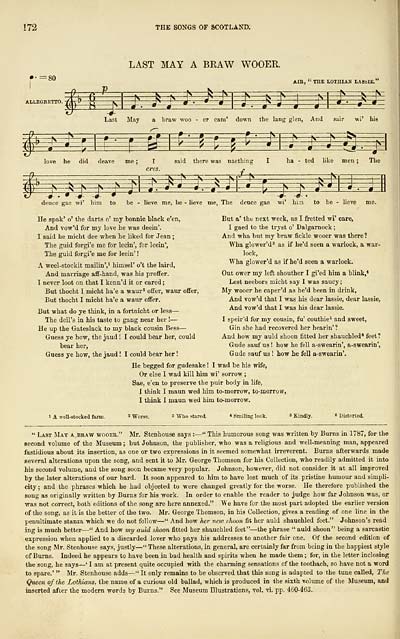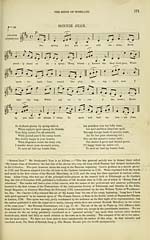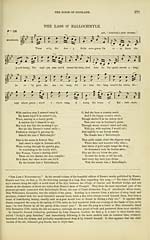Glen Collection of printed music > Printed music > Wood's edition of the songs of Scotland
(196) Page 172 - Last May a braw wooer
Download files
Complete book:
Individual page:
Thumbnail gallery: Grid view | List view

172
THE SONGS OF SCOTLAND.
LAST MAY A BKAW WOOEE.
= 80
ALLEGRETTO
AIB, " THE LOTHIAN LASSIE."
•m
?
■fr-fr-A=^BE
-*— ■*-
r~ ^i fc
Last May a braw woo - er cam' down the lang glen, And flair wi' his
i
s
^
fc=^
«^=
love he did deave me ; I
cres.
=*=S
said there was naething I ha - ted like men ; The
^ -r-
S
^1
£^^^^3
&*=±=&=^
deuce gae wi' him to be - lieve me, be - lieve me, The deuce
wi' him to be - lieve me.
He spak' o' the darts o' my bonnic black e'en,
And vow'd for my love he was deein'.
I said he micht dee when he liked for Jean ;
The guid forgi'e me for leein', for leein',
The guid forgi'e me for leein' !
A weel-stockit mailin', 1 himsel' o't the laird,
And marriage aff-hand, was his proffer.
I never loot on that I kenn'd it or cared ;
But thocht I micht ha'e a waur 2 offer, waur offer,
But thocht I micht ha'e a waur offer.
But what do ye think, in a fortnicht or less —
The deil's in his taste to gang near her ! —
He up the Gateslack to my black cousin Bess —
Guess ye how, the jaud ! I could bear her, could
bear her,
Guess ye how, the jaud ! I could bear her !
He begged for gudesake ! I wad be his wife,
Or else I wad kill him wi' sorrow ;
Sae, e'en to preserve the puir body in life,
I think I maun wed him to-morrow, to-morrow,
I think I maun wed him to-morrow.
But a' the next week, as I fretted wi' care,
I gaed to the tryst o' Dalgarnock ;
And wha but my braw fickle wooer was there?
Wha glower'd 3 as if he'd seen a warlock, a war-
lock,
Wha glower'd as if he'd seen a warlock.
Out ower my left shouther I gi'ed him a blink, 4
Lest neebors micht say I was saucy ;
My wooer he caper'd as he'd been in drink,
And vow'd that I was his dear lassie, dear lassie,
And vow'd that I was his dear lassie.
I speir'd for my cousin, fu' couthie 6 and sweet,
Gin she had recovered her hearin' ?
And how my auld shoon fitted her shauchled 11 feet?
Gude sauf us! how he fell a-swearin', a-swearin',
Gude sauf us ! how he fell a-swearin'.
1 A well-stocked farm.
- Worse.
s Who stared.
> Smiling look.
» Kindly.
6 Distorted.
" Last Mat abkaw wooee." Mr. Stenhouse says : — " This humorous song was written by Burns in 1787, for the
second volume of the Museum ; but Johnson, the publisher, who was a religious and well-meaning man, appeared
fastidious about its insertion, as one or two expressions in it seemed somewhat irreverent. Burns afterwards made
several alterations upon the song, and sent it to Mr. George Thomson for his Collection, who readily admitted it into
his second volume, and the song soon became very popular. Johnson, however, did not consider it at all improved
by the later alterations of our bard. It soon appeared to him to have lost much of its pristine humour and simpli-
city ; and the phrases which he had objected to were changed greatly for the worse. He therefore published the
song as originally written by Burns for his work. In order to enable the reader to judge how far Johnson was, or
was not correct, both editions of the song are here annexed." We have for the most part adopted the earlier version
of the song, as it is the better of the two. Mr. George Thomson, in his Collection, gives, a reading of one line in the
penultimate stanza which we do not follow — " And how her neto shoon fit her auld shauchled feet." Johnson's read
ing is much better — " And how my auld shoon fitted her shauchled feet" — the phrase " auld shoon" being a sarcastic
expression when applied to a discarded lover who pays his addresses to another fair one. Of the Becond edition of
the song Mr. Stenhouse says, justly — " These alterations, in general, are certainly far from being in the happiest style
of Burns. Indeed he appears to have been in bad health and spirits when he made them ; for, in the letter inclosing
the song, he says—' I am at present quite occupied with the charming sensations of the toothach, so have not a word
to spare.' " Mr. Stenhouse adds — " It only remains to be observed that this song is adapted to the tune called, The
Queen of the Lothians, the name of a curious old ballad, which is produced in the sixth volume of the Museum, and
inserted after the modern words by Burns." See Aluseum Illustrations, vol. vi. pp. 460-463.
THE SONGS OF SCOTLAND.
LAST MAY A BKAW WOOEE.
= 80
ALLEGRETTO
AIB, " THE LOTHIAN LASSIE."
•m
?
■fr-fr-A=^BE
-*— ■*-
r~ ^i fc
Last May a braw woo - er cam' down the lang glen, And flair wi' his
i
s
^
fc=^
«^=
love he did deave me ; I
cres.
=*=S
said there was naething I ha - ted like men ; The
^ -r-
S
^1
£^^^^3
&*=±=&=^
deuce gae wi' him to be - lieve me, be - lieve me, The deuce
wi' him to be - lieve me.
He spak' o' the darts o' my bonnic black e'en,
And vow'd for my love he was deein'.
I said he micht dee when he liked for Jean ;
The guid forgi'e me for leein', for leein',
The guid forgi'e me for leein' !
A weel-stockit mailin', 1 himsel' o't the laird,
And marriage aff-hand, was his proffer.
I never loot on that I kenn'd it or cared ;
But thocht I micht ha'e a waur 2 offer, waur offer,
But thocht I micht ha'e a waur offer.
But what do ye think, in a fortnicht or less —
The deil's in his taste to gang near her ! —
He up the Gateslack to my black cousin Bess —
Guess ye how, the jaud ! I could bear her, could
bear her,
Guess ye how, the jaud ! I could bear her !
He begged for gudesake ! I wad be his wife,
Or else I wad kill him wi' sorrow ;
Sae, e'en to preserve the puir body in life,
I think I maun wed him to-morrow, to-morrow,
I think I maun wed him to-morrow.
But a' the next week, as I fretted wi' care,
I gaed to the tryst o' Dalgarnock ;
And wha but my braw fickle wooer was there?
Wha glower'd 3 as if he'd seen a warlock, a war-
lock,
Wha glower'd as if he'd seen a warlock.
Out ower my left shouther I gi'ed him a blink, 4
Lest neebors micht say I was saucy ;
My wooer he caper'd as he'd been in drink,
And vow'd that I was his dear lassie, dear lassie,
And vow'd that I was his dear lassie.
I speir'd for my cousin, fu' couthie 6 and sweet,
Gin she had recovered her hearin' ?
And how my auld shoon fitted her shauchled 11 feet?
Gude sauf us! how he fell a-swearin', a-swearin',
Gude sauf us ! how he fell a-swearin'.
1 A well-stocked farm.
- Worse.
s Who stared.
> Smiling look.
» Kindly.
6 Distorted.
" Last Mat abkaw wooee." Mr. Stenhouse says : — " This humorous song was written by Burns in 1787, for the
second volume of the Museum ; but Johnson, the publisher, who was a religious and well-meaning man, appeared
fastidious about its insertion, as one or two expressions in it seemed somewhat irreverent. Burns afterwards made
several alterations upon the song, and sent it to Mr. George Thomson for his Collection, who readily admitted it into
his second volume, and the song soon became very popular. Johnson, however, did not consider it at all improved
by the later alterations of our bard. It soon appeared to him to have lost much of its pristine humour and simpli-
city ; and the phrases which he had objected to were changed greatly for the worse. He therefore published the
song as originally written by Burns for his work. In order to enable the reader to judge how far Johnson was, or
was not correct, both editions of the song are here annexed." We have for the most part adopted the earlier version
of the song, as it is the better of the two. Mr. George Thomson, in his Collection, gives, a reading of one line in the
penultimate stanza which we do not follow — " And how her neto shoon fit her auld shauchled feet." Johnson's read
ing is much better — " And how my auld shoon fitted her shauchled feet" — the phrase " auld shoon" being a sarcastic
expression when applied to a discarded lover who pays his addresses to another fair one. Of the Becond edition of
the song Mr. Stenhouse says, justly — " These alterations, in general, are certainly far from being in the happiest style
of Burns. Indeed he appears to have been in bad health and spirits when he made them ; for, in the letter inclosing
the song, he says—' I am at present quite occupied with the charming sensations of the toothach, so have not a word
to spare.' " Mr. Stenhouse adds — " It only remains to be observed that this song is adapted to the tune called, The
Queen of the Lothians, the name of a curious old ballad, which is produced in the sixth volume of the Museum, and
inserted after the modern words by Burns." See Aluseum Illustrations, vol. vi. pp. 460-463.
Set display mode to: Large image | Transcription
Images and transcriptions on this page, including medium image downloads, may be used under the Creative Commons Attribution 4.0 International Licence unless otherwise stated. ![]()
| Special collections of printed music > Glen Collection of printed music > Printed music > Wood's edition of the songs of Scotland > (196) Page 172 - Last May a braw wooer |
|---|
| Permanent URL | https://digital.nls.uk/91340095 |
|---|
| Description | Scottish songs and music of the 18th and early 19th centuries, including music for the Highland bagpipe. These are selected items from the collection of John Glen (1833 to 1904). Also includes a few manuscripts, some treatises, and other books on the subject. |
|---|
| Description | The Glen Collection and the Inglis Collection represent mainly 18th and 19th century Scottish music, including Scottish songs. The collections of Berlioz and Verdi collected by bibliographer Cecil Hopkinson contain contemporary and later editions of the works of the two composers Berlioz and Verdi. |
|---|

